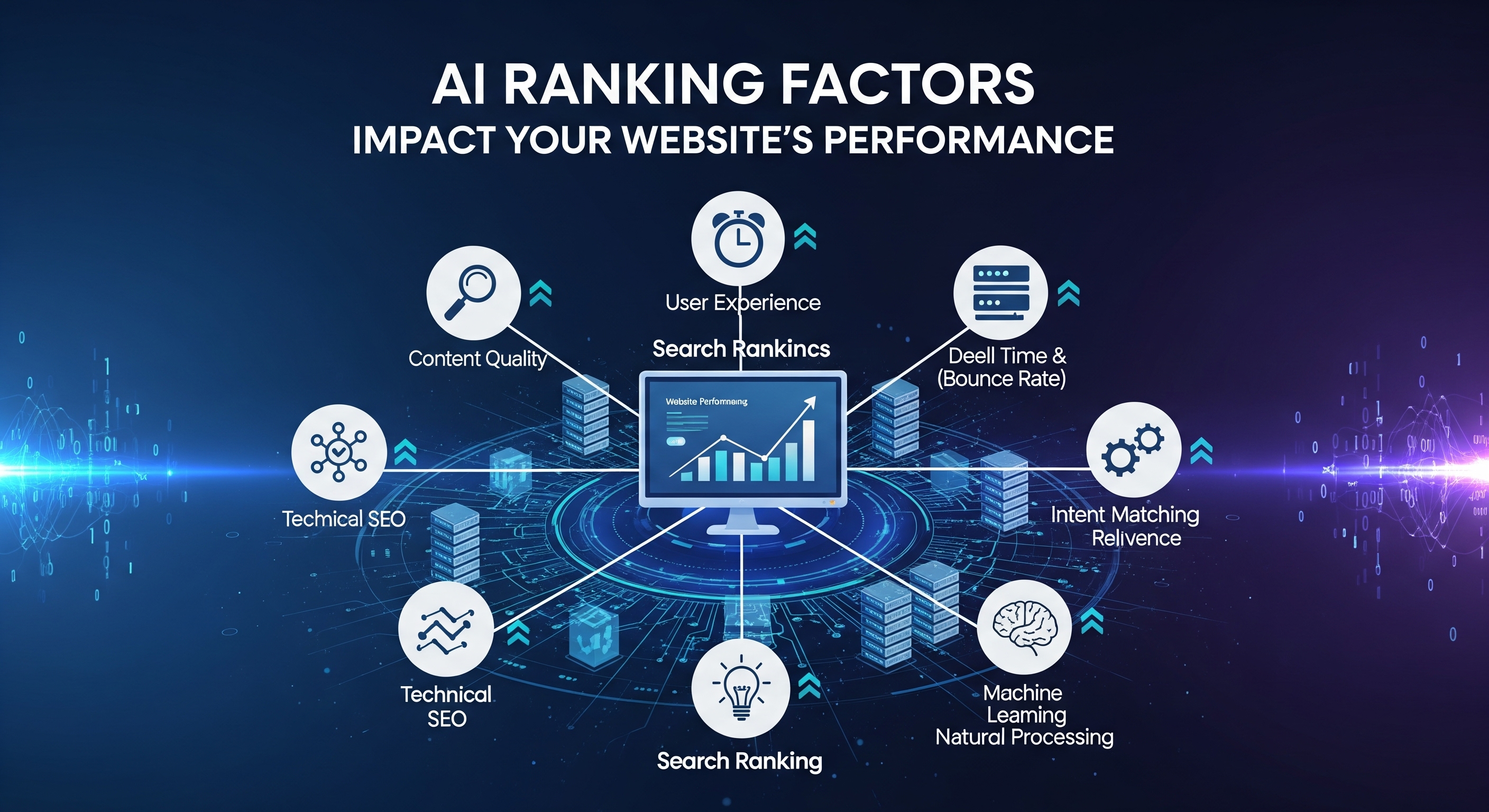
The digital landscape is constantly evolving, and a seismic shift is underway, driven by the rapid advancement of artificial intelligence. Gone are the days when SEO was a simple game of keyword stuffing and link building. Today, search engines are powered by sophisticated AI models that think more like humans, understanding context, nuance, and user intent. This new era of search requires a new approach to optimization.
Understanding these AI ranking factors isn't just about getting a higher position on a search results page. It's about building a digital presence that is genuinely helpful, authoritative, and trustworthy. It's about future-proofing your business in a world where AI-powered search is the norm. If you're wondering why your website isn't performing as well as it used to, or how you can get ahead of the curve, you've come to the right place. Let's dive deep into the AI ranking factors that are now shaping your website's fate.
In the early days of search, algorithms were relatively simple. They acted like digital librarians, matching the keywords in a user's query to the keywords on a webpage. If you wanted to rank for "best running shoes," you'd make sure that phrase appeared frequently on your page. This approach was easy to game and often led to a poor user experience, with websites filled with repetitive, unnatural-sounding text.
AI changed everything. With the introduction of models like Google's RankBrain and BERT, search engines began to understand the true meaning behind a user's query. They moved beyond mere keywords to grasp the underlying search intent. They now interpret the context of a query, analyze the relationships between words, and can even understand synonyms and related concepts. This means your content needs to be more than just a list of keywords; it needs to be a comprehensive, high-quality answer to a user's problem.

So, what exactly are these AI ranking factors that you need to be aware of? They can be broken down into several key categories. While many of these overlap with traditional SEO, AI's ability to analyze them at a much deeper level has made them more critical than ever.
This is arguably the most important factor in the AI era. AI algorithms are designed to reward content that is helpful, comprehensive, and provides genuine value to the reader. They are looking for content that demonstrates E-E-A-T: Experience, Expertise, Authoritativeness, and Trustworthiness.
AI is incredibly good at identifying and penalizing "thin" or "search engine-first" content—content that is written simply to rank, without providing real value. The more detailed and insightful your content, the more likely it is to be recognized as valuable by these sophisticated algorithms.
AI and machine learning are constantly analyzing how users interact with your website. These user experience signals are powerful indicators of your content's quality and relevance. AI uses these metrics to determine if your website is truly satisfying the user's needs.
In the AI-driven world, a great user experience is no longer just a bonus; it's a critical ranking factor. A website that is fast, easy to navigate, and visually stable will be rewarded with higher rankings.
Structured data is a powerful tool for communicating with AI. It's a type of code that you can add to your website to help search engines understand the context and meaning of your content. Think of it as a translator that helps AI algorithms categorize and interpret your information more effectively.
Implementing comprehensive and correct schema markup gives AI a clear signal about what your content is about, significantly increasing its chances of being featured in various search experiences.
With the introduction of new generative AI search experiences, a growing number of searches are now considered "zero-click" searches. This means users find their answer directly in the search results, in a knowledge panel, a featured snippet, or an AI Overview, without ever needing to click through to a website.
This trend doesn't mean your content is becoming less important. In fact, it means the opposite. AI Overviews and other generative results still rely on high-quality, authoritative websites as their source. The challenge now is to become one of those trusted sources. To be cited by AI, your content needs to be:
Optimizing for this new search reality means creating content that is not only compelling for humans but also easy for AI to parse and summarize.

Navigating this complex, AI-driven landscape can feel overwhelming. The rules are always changing, and what worked yesterday may not work today. This is where a strategic partner like Finch can make all the difference.
Finch is not just another digital marketing agency. We are an eCommerce performance marketing firm that uses proprietary technology and a global team of experts to help businesses evolve and scale. We understand that a one-size-fits-all approach no longer works. Our strategies are built on a foundation of data-driven insights, ensuring every decision we make is rooted in what the algorithms—and your customers—actually want.
Our services are designed to address the specific challenges of the AI era, including:
We are ruthlessly focused on enabling businesses to achieve profitable growth. We help our clients become the authoritative voices in their industries, crafting content that not only ranks well but also drives genuine engagement and conversions.
The rise of AI in search is not something to be feared, but something to be embraced. It’s a call to action to move beyond old-school SEO tactics and focus on what truly matters: creating a phenomenal user experience with high-quality, authoritative content. By understanding and adapting to these AI ranking factors, you can build a robust, sustainable online presence that will thrive for years to come.
The future of your website's performance is tied to how well you can satisfy both your human audience and the intelligent algorithms that are designed to serve them. Don't let your business get left behind in this new digital era.
Ready to boost your website's performance and grow your business with a data-driven, AI-informed strategy?
Contact Finch today for a consultation and let's build a performance marketing plan that delivers results.
A: A "people-first" content strategy is an approach to content creation where the primary goal is to provide genuine value and a great experience for the human reader. It focuses on answering a user's questions thoroughly, demonstrating expertise, and ensuring the content is easy to read and understand. This is in contrast to "search engine-first" content, which is created primarily to manipulate search rankings with keyword-heavy text that often lacks depth or usefulness.
A: AI Overviews, which are generative AI summaries that appear at the top of some search results, can have a complex effect on your traffic. On one hand, they can lead to "zero-click" searches, where users get their answer without visiting your site. On the other hand, if your website is cited as a source within an AI Overview, it can significantly boost your authority and visibility. The key is to create content that is so comprehensive and authoritative that it becomes a trusted source for the AI, increasing your chances of being featured.
A: E-E-A-T stands for Experience, Expertise, Authoritativeness, and Trustworthiness. It's a set of guidelines used by Google's Quality Raters to evaluate the quality of a website and its content. AI algorithms have been trained to identify and reward these same qualities. Demonstrating E-E-A-T is crucial because it signals to both human raters and AI algorithms that your website is a reliable, credible source of information, which is a major factor in how it ranks.
A: Structured data, or schema markup, is a powerful tool for improving your SEO by helping search engines understand your content. By adding specific code to your website, you can tell search engines what your content is about. For example, using FAQ schema for a list of questions and answers can help that content appear as a featured snippet. Implementing product schema for your eCommerce pages can lead to rich results that display pricing and reviews. This clarity helps AI process your information more efficiently and display it more prominently.